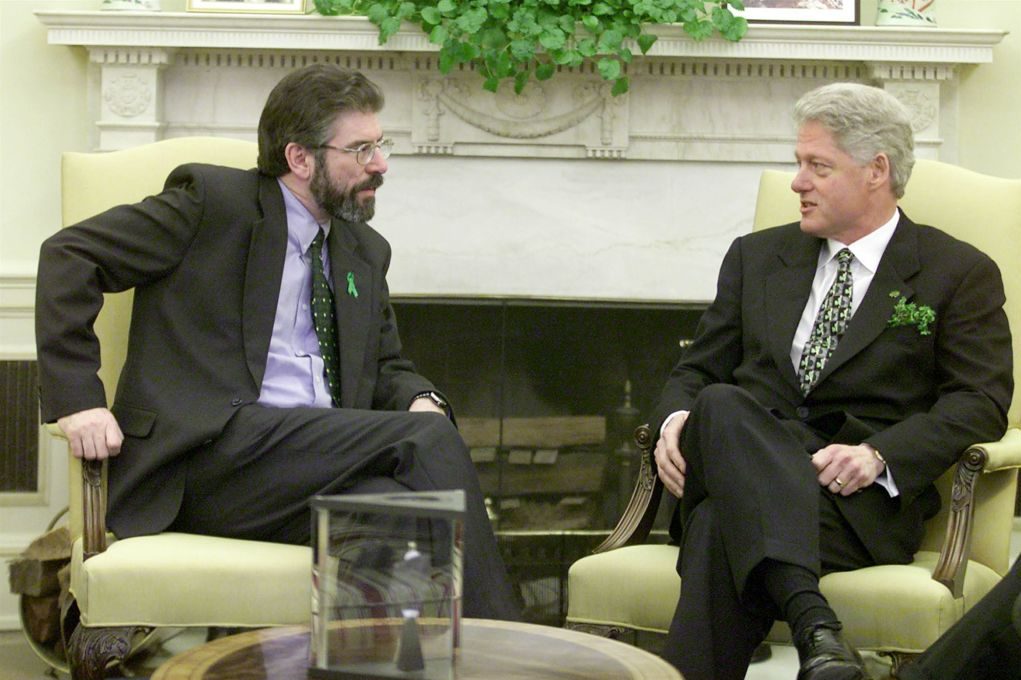For Democrats and their friends in the Irish-American community, there were really only two parties who achieved the Good Friday Agreement: the Clinton administration and the courageous peacemakers of the Irish Republican movement.
And so it was that Bill Clinton and Gerry Adams topped the bill last Monday at a grand back-slapping affair for Sinn Féin and their unnamed comrades in New York.
Held in the Great Hall at Cooper Union where — the full-to-capacity audience was reminded — Abraham Lincoln had once made a historic 1860 speech opposing the spread of slavery, the pair spoke, separately, at a free event titled “Reflections on The Good Friday Agreement: Twenty-Five Years of Peace & Progress.” It should have added “…towards a united Ireland” to the title because that was a hoped-for outcome expressed many times over the course of three long hours.
‘The Unionists are our neighbors… We want them to become our friends.’
Gerry Adams
As event organizer Marty Glennon spelled out in his opening address, a “united Ireland” and a “peaceful Ireland” were indivisible. The “full, true purpose” of the Agreement, he said, was “the reunification of Ireland.”
When in 1994 the National Committee on American Foreign Policy held their first conference on Northern Ireland, Clinton famously ignored the advice of most of his government and gave Gerry Adams a visa to attend. His decision so outraged Unionist leaders Jim Molyneaux and Ian Paisley that they canceled their flights and missed the event.
Curiously, there were no Unionists at the Cooper Union shindig either. It must have been an oversight at an event that was supposedly all about reconciliation. But then, as some of their leaders have complained bitterly, Unionists don’t seem to exist for Irish-Americans.
Instead, the event was hosted by eight august and romantically-named Irish-American groups, including the Ladies Ancient Order of Hibernians, the Friendly Sons of St. Patrick and the Friends of Sinn Féin. It was, however, very much SF’s night.
There was musical accompaniment from a duo singing rebel songs and the stage was decorated in shimmering emerald which perfectly matched the colors many of the guests were wearing.
There was also a glowing tribute to former Sinn Féin general secretary Rita O’Hare (the party’s representative to the US in later years until her death this year) that didn’t mention her arrest for the attempted murder of a British soldier in 1971 or the three-year sentence she served for smuggling explosives to an IRA member. “She believed in the power of peace and the power of love,” the audience was told.
Massachusetts Democratic congressman Richie Neal paid tribute, as did others, to the 1981 Republican hunger strikers (last year he planted a “unity tree” in their honor). The way they’d been “treated upon death” galvanized Irish-American opinion, his included. (For the record, the most famous of them, Bobby Sands, was allowed to have a funeral with full IRA military honors.)
Marty Glennon could barely get a sentence out in his glowing introduction of Gerry Adams — one that managed not to mention “IRA” once — without being interrupted by applause. The Sinn Féin leader was “steadfast in his commitment to achieving a United Ireland by peaceful means,” he said.
Glennon recalled Adams once addressing a boozy meeting in New York at which someone asked him where he stood on the then contentious issue of gays and lesbians taking part in the St. Patrick’s Day Parade. Adams replied:
“Brothers and sisters, this is why I’m here. There’s a place for everyone at the table.”
It was at that moment, said Glennon reverently, that “I knew that Gerry Adams was the real deal… Gerry’s message was not about Ireland. It was about tolerance of all diverse backgrounds and political beliefs.” It should be added that Glennon, a lawyer, said all this with a straight face.
As for the “real deal,” Adams provided a potted history of events in Ulster around the time of the Agreement and Britain’s invidious role in the search for peace. “The Unionists are our neighbors,” he said. “We want them to become our friends.”
Next up was Bill. Had the former US president and Rhodes scholar known he was attending such a one-sided event? He certainly didn’t appear remotely bothered. He didn’t get any applause for giving credit to John Major for starting to talk about a peace process in 1992, despite knowing the Unionists could bring him down.
Clinton said he believes the Agreement worked out because Unionists knew that demographic trends meant they would eventually lose their majority. He suggested that immigration may eventually make old antagonisms irrelevant: “If someone had told you ten years ago that the names of the leaders of the UK and Ireland would be what they are today, how much would you have bet against it?” Even so, he added without elaborating, “we need to finish the job there.”
He didn’t mention Brexit, but Congressman Neal, humble-bragging all night about his staunch history of taking on the Brits and standing up for a free and united Ireland, alluded to it when he berated the British government for “becoming sort of cavalier” about the Agreement when so many had died to achieve it.
The final word of the evening went to Bill McDermott, a representative from the Friendly Sons of St. Patrick. Having heard so much from the Not So Friendly Sons, it was cheering to learn that he believes that the main priority with Irish-Americans is “education, education, education of those who don’t know” how it is in Northern Ireland. It’s certainly true that Irish Americans have long stood accused of being painfully clueless about the situation there.
But with Sinn Féin alone to educate them, perhaps blissful ignorance might be preferable.
This article was originally published on The Spectator’s UK website.


















